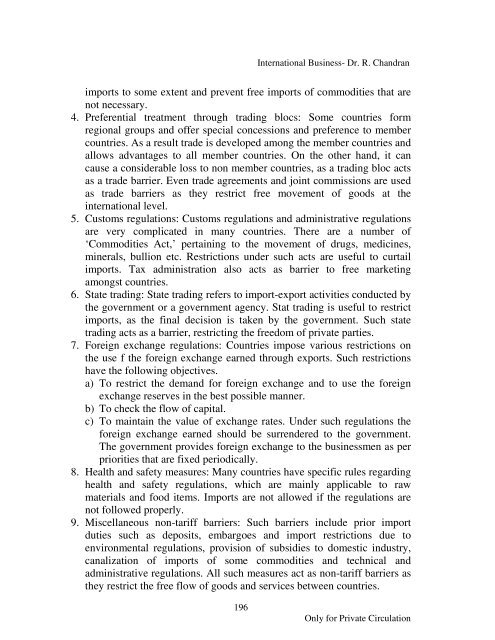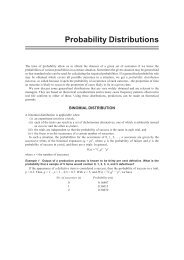International-Business-Dr-R-Chandran-E-book
International-Business-Dr-R-Chandran-E-book
International-Business-Dr-R-Chandran-E-book
You also want an ePaper? Increase the reach of your titles
YUMPU automatically turns print PDFs into web optimized ePapers that Google loves.
196<br />
<strong>International</strong> <strong>Business</strong>- <strong>Dr</strong>. R. <strong>Chandran</strong><br />
imports to some extent and prevent free imports of commodities that are<br />
not necessary.<br />
4. Preferential treatment through trading blocs: Some countries form<br />
regional groups and offer special concessions and preference to member<br />
countries. As a result trade is developed among the member countries and<br />
allows advantages to all member countries. On the other hand, it can<br />
cause a considerable loss to non member countries, as a trading bloc acts<br />
as a trade barrier. Even trade agreements and joint commissions are used<br />
as trade barriers as they restrict free movement of goods at the<br />
international level.<br />
5. Customs regulations: Customs regulations and administrative regulations<br />
are very complicated in many countries. There are a number of<br />
‘Commodities Act,’ pertaining to the movement of drugs, medicines,<br />
minerals, bullion etc. Restrictions under such acts are useful to curtail<br />
imports. Tax administration also acts as barrier to free marketing<br />
amongst countries.<br />
6. State trading: State trading refers to import-export activities conducted by<br />
the government or a government agency. Stat trading is useful to restrict<br />
imports, as the final decision is taken by the government. Such state<br />
trading acts as a barrier, restricting the freedom of private parties.<br />
7. Foreign exchange regulations: Countries impose various restrictions on<br />
the use f the foreign exchange earned through exports. Such restrictions<br />
have the following objectives.<br />
a) To restrict the demand for foreign exchange and to use the foreign<br />
exchange reserves in the best possible manner.<br />
b) To check the flow of capital.<br />
c) To maintain the value of exchange rates. Under such regulations the<br />
foreign exchange earned should be surrendered to the government.<br />
The government provides foreign exchange to the businessmen as per<br />
priorities that are fixed periodically.<br />
8. Health and safety measures: Many countries have specific rules regarding<br />
health and safety regulations, which are mainly applicable to raw<br />
materials and food items. Imports are not allowed if the regulations are<br />
not followed properly.<br />
9. Miscellaneous non-tariff barriers: Such barriers include prior import<br />
duties such as deposits, embargoes and import restrictions due to<br />
environmental regulations, provision of subsidies to domestic industry,<br />
canalization of imports of some commodities and technical and<br />
administrative regulations. All such measures act as non-tariff barriers as<br />
they restrict the free flow of goods and services between countries.<br />
Only for Private Circulation





